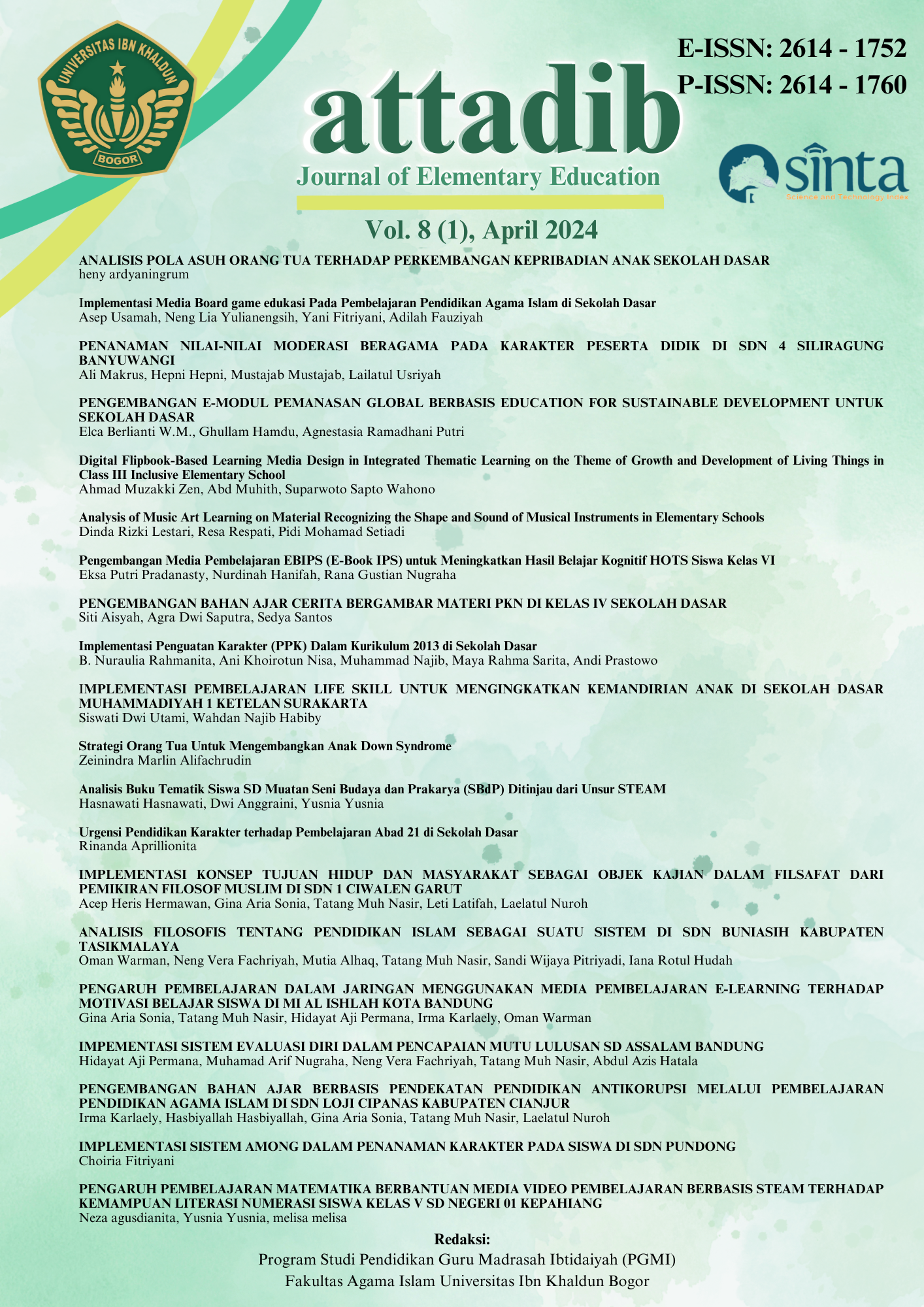MEMBANGUN KARAKTER KEBANGSAAN MELALUI PENDIDIKAN MULTIKULTURAL BERBASIS AL-QURAN
DOI:
https://doi.org/10.32832/at-tadib.v2i2.19373Keywords:
character Education, Multicultural, Qur'anAbstract
One of the problems the community posmodern is the euphoria of celebrating differences. However, when the author of saving the current multiculturalism it reached eksremitasnya, it will give birth to racism. I.e. the peak when an individual or group to establish the difference so as not to be reunited. Surely this discourse is very contrary to the explanation of the Koran (al-Hujarat: 13), which indicates that the entire nation is comrade, the whole man is a friend, and most recently the goal is peace. Although the reality was, to this day Islam often desebut as a religion of violence and anti-kemajemukan. Thus, how the concept of national character building through multicultural education based al-Quran?.
Approach libraries research towards literature-related literature, this study concludes that the concept of multicultural education based Koran in building national character brings the humanist theory of teosentris includes five principles, namely: Believe In The One Supreme God, Humanity, Unity, Democracy, Justice. It is based on the description of al-Quran regarding interconnection and harmonious interaction between man and God, man with himself, man with human. The methods used in this study is the tafsir method maudhu'i and the historical-critical method-contextual. While the approach used was qualitative and quantitative approach. A qualitative approach is used to generate data which is the descriptive results are presented in the form of qualitative. Whereas the quantitative approach, is used to generate the data through a series of observations about the verses that relate.
References
Ahmad, Anis. Review of TheQur'ān, Liberation and Pluralism: An Islamic Perspective of Inter-Religious Solidarity Against Oppression, by Farid Esack, Islamic Studies 38 (Winter 1999): 628-629.
Al-Farmawi, Abd al-Hayy. al-Bidayah fi al-Tafsir al-Maud}u’iyyah: Dirasah Manhajiyyah Maudu’iyyah. Mesir: Maktabah Jumhuriyyah, t.th
Azra, Azyumardi. 2007. Merawat Kemajemukan Merawat Indonesia. Yogyakarta: Kanisius.
Banks, James A. 2008. An Introduction Multicultural Education. Boston: Pearson. Echols, John M., and Hassan Shadili. n.d. Kamus Inggris Indonesia An English-
Indonesian Dictionary. Cet. XXVI. Jakarta: PT Gramedia.
Gorski, Paul C. 2005. Multiculture Education and The Internet Intersection and Integrations, Second Edition. New York: McGraw-Hill.
Ghosh Ratna, and Mariusz Galczynski. 2014. Redefining Multicultural Education Inclusion and The Right To Be Different. Edited by 3. Toronto: Canadian Sholar‟s Press Inc.
Hadi, Syamsul. 2007. Disintegrasi Pasca Orde Baru: Negara Konflik Lokal Dan Dinamika International. Jakarta: Yayasan Obor.
Hafidhuddin, Didin. Al-Qur’a>n dalam Arus Globalisasi dan Modernitas.
Banten: Lembaga Pengembangan Studi dan Informasi LPSI, 2004.
Hamka, 2004. Tafsir Al-Azhar. Jakarta: PT Pustaka Panjimas.
- , Tasawuf Modern. Jakarta: Pustaka Panjimas,1987.
- , Pribadi Hebat. Jakarta: Gema Insani, 2014.
----------, Dari Lembah Cita-Cita (Jakarta: Bulan Bintang, 1982.
- , Umat Islam Menghadapi Tangan Kristenisasi dan Sekulerisasi. Jakarta:
Pustaka Panjimas, 2003.
- , Keadilan Sosial dalam Islam (Jakarta: Gema Insani, 2015.
Hamka, Nasir, Muzakkir, Anshary, Singodimedji, Debat Dasar Negara Islam dan Pancasila Konstituante 1957: Urat Tungang Pancasila. Jakarta: Pustaka Panji Mas, 2001.
Hamka, dalam Rusjdi (ed.), StudiIslam: Revolusi Ideologi dan Keadilan Sosial.
Jakarta: PT Pustaka Panjimas, 1984.
Kaelan, Metode Penelitian Agama Kualitatif Interdisipliner. Yogyakarta: Paradigma, 2010.
Kahn, S. Joel, 2016. Kultur, Multikultur, Postkultur. Yogyakarta: Institute of Nation Development Studies (INDes).
Khir, Bustami Mohamed. “The Qur‟an and Science: The Debate On Validity of Scientific Interpretations”, Journal of Qur’anic Studies, Vol 7, No. 1 (2005): pp. 1-32 http://www.jstor.org/stable/25727996, (Accessed: 29/05/2015).
Moleong, Lexy J. Metodologi Penelitian Kualitatif. Bandung, PT. Remaja Rosdakarya, 2013.
Ridwan al-Makassary dan Suparto, ed., Cerita Sukses Pendidikan Multikultural di Indonesia (Jakarta: Csrc UIN Jakarta, 2010), 11-13.
Sugiono, Metode Penelitian Kuantitatif Kualitatif dan R&D. Bandung: Alfabeta, 2008.
Zamir, Syed Rizwan. “The Hermeunetics of Imitation and “Adab” in Ibn “Arabi‟s Interpretation of The Qur‟an”, Islamic Studies, Vol. 50, No. 1 (Spring 2011): pp. 5-3, http://www.jstor.org/stable/162599, (Accessed: 29/05/2015).
























